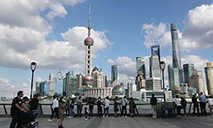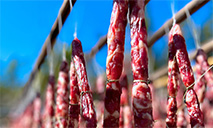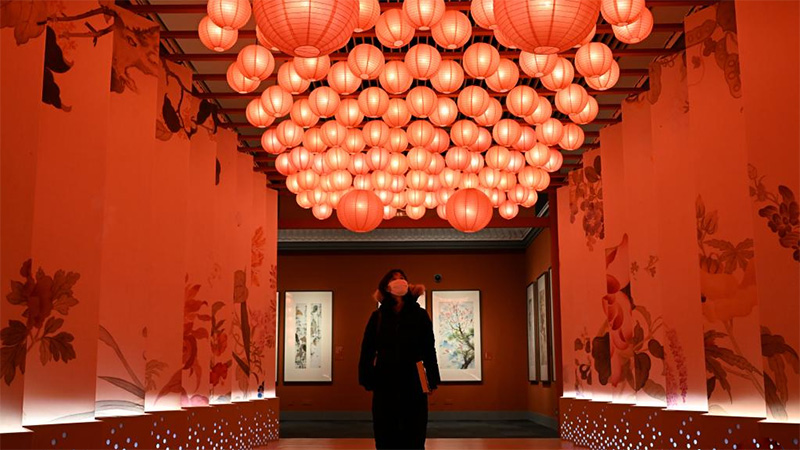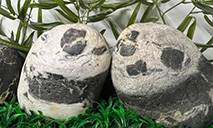Curling stones used at Olympic events manufactured in Scotland, Britain

Jim English, manager of Kays Curling factory, shows a piece of the Ailsa Craig granite in the factory in Mauchline, Scotland, Britain, Jan. 24, 2022. Every single Olympic curling stone is made of granite from a little island off the west coast of Scotland, called Ailsa Craig. The Ailsa Craig granite is some of the hardest found in the world and maintains its shape despite grinding and wet conditions, making it perfect material for curling stone. All curling stones used at Olympic events are manufactured by Kays Curling in Mauchline, Scotland, Britain. (Xinhua/Li Ying)

A piece of Ailsa Craig granite is seen before cutting in Kays Curling factory in Mauchline, Scotland, Britain, Jan. 24, 2022. Every single Olympic curling stone is made of granite from a little island off the west coast of Scotland, called Ailsa Craig. The Ailsa Craig granite is some of the hardest found in the world and maintains its shape despite grinding and wet conditions, making it perfect material for curling stone. All curling stones used at Olympic events are manufactured by Kays Curling in Mauchline, Scotland, Britain. (Xinhua/Li Ying)

The island of Ailsa Craig is seen in the mist in Scotland, Britain, Jan. 24, 2022. Every single Olympic curling stone is made of granite from a little island off the west coast of Scotland, called Ailsa Craig. The Ailsa Craig granite is some of the hardest found in the world and maintains its shape despite grinding and wet conditions, making it perfect material for curling stone. All curling stones used at Olympic events are manufactured by Kays Curling in Mauchline, Scotland, Britain. (Xinhua/Li Ying)

A man works in Kays Curling factory in Mauchline, Scotland, Britain, Jan. 24, 2022. Every single Olympic curling stone is made of granite from a little island off the west coast of Scotland, called Ailsa Craig. The Ailsa Craig granite is some of the hardest found in the world and maintains its shape despite grinding and wet conditions, making it perfect material for curling stone. All curling stones used at Olympic events are manufactured by Kays Curling in Mauchline, Scotland, Britain. (Xinhua/Li Ying)

A piece of Ailsa Craig granite is seen after cutting in Kays Curling factory in Mauchline, Scotland, Britain, Jan. 24, 2022. Every single Olympic curling stone is made of granite from a little island off the west coast of Scotland, called Ailsa Craig. The Ailsa Craig granite is some of the hardest found in the world and maintains its shape despite grinding and wet conditions, making it perfect material for curling stone. All curling stones used at Olympic events are manufactured by Kays Curling in Mauchline, Scotland, Britain. (Xinhua/Li Ying)

A man works in Kays Curling factory in Mauchline, Scotland, Britain, Jan. 24, 2022. Every single Olympic curling stone is made of granite from a little island off the west coast of Scotland, called Ailsa Craig. The Ailsa Craig granite is some of the hardest found in the world and maintains its shape despite grinding and wet conditions, making it perfect material for curling stone. All curling stones used at Olympic events are manufactured by Kays Curling in Mauchline, Scotland, Britain. (Xinhua/Li Ying)

A man deals with stones which have been cut from a piece of Ailsa Craig granite in Kays Curling factory in Mauchline, Scotland, Britain, Jan. 24, 2022. Every single Olympic curling stone is made of granite from a little island off the west coast of Scotland, called Ailsa Craig. The Ailsa Craig granite is some of the hardest found in the world and maintains its shape despite grinding and wet conditions, making it perfect material for curling stone. All curling stones used at Olympic events are manufactured by Kays Curling in Mauchline, Scotland, Britain. (Xinhua/Li Ying)

A man works in Kays Curling factory in Mauchline, Scotland, Britain, Jan. 24, 2022. Every single Olympic curling stone is made of granite from a little island off the west coast of Scotland, called Ailsa Craig. The Ailsa Craig granite is some of the hardest found in the world and maintains its shape despite grinding and wet conditions, making it perfect material for curling stone. All curling stones used at Olympic events are manufactured by Kays Curling in Mauchline, Scotland, Britain. (Xinhua/Li Ying)

Curling stones are seen in Kays Curling factory in Mauchline, Scotland, Britain, Jan. 24, 2022. Every single Olympic curling stone is made of granite from a little island off the west coast of Scotland, called Ailsa Craig. The Ailsa Craig granite is some of the hardest found in the world and maintains its shape despite grinding and wet conditions, making it perfect material for curling stone. All curling stones used at Olympic events are manufactured by Kays Curling in Mauchline, Scotland, Britain. (Xinhua/Li Ying)

Curling stones are seen outside of Kays Curling factory in Mauchline, Scotland, Britain, Jan. 24, 2022. Every single Olympic curling stone is made of granite from a little island off the west coast of Scotland, called Ailsa Craig. The Ailsa Craig granite is some of the hardest found in the world and maintains its shape despite grinding and wet conditions, making it perfect material for curling stone. All curling stones used at Olympic events are manufactured by Kays Curling in Mauchline, Scotland, Britain. (Xinhua/Li Ying)

Curling stones are seen in Kays Curling factory in Mauchline, Scotland, Britain, Jan. 24, 2022. Every single Olympic curling stone is made of granite from a little island off the west coast of Scotland, called Ailsa Craig. The Ailsa Craig granite is some of the hardest found in the world and maintains its shape despite grinding and wet conditions, making it perfect material for curling stone. All curling stones used at Olympic events are manufactured by Kays Curling in Mauchline, Scotland, Britain. (Xinhua/Li Ying)

A man works in Kays Curling factory in Mauchline, Scotland, Britain, Jan. 24, 2022. Every single Olympic curling stone is made of granite from a little island off the west coast of Scotland, called Ailsa Craig. The Ailsa Craig granite is some of the hardest found in the world and maintains its shape despite grinding and wet conditions, making it perfect material for curling stone. All curling stones used at Olympic events are manufactured by Kays Curling in Mauchline, Scotland, Britain. (Xinhua/Li Ying)

A man works in Kays Curling factory in Mauchline, Scotland, Britain, Jan. 24, 2022. Every single Olympic curling stone is made of granite from a little island off the west coast of Scotland, called Ailsa Craig. The Ailsa Craig granite is some of the hardest found in the world and maintains its shape despite grinding and wet conditions, making it perfect material for curling stone. All curling stones used at Olympic events are manufactured by Kays Curling in Mauchline, Scotland, Britain. (Xinhua/Li Ying)

A man works in Kays Curling factory in Mauchline, Scotland, Britain, Jan. 24, 2022. Every single Olympic curling stone is made of granite from a little island off the west coast of Scotland, called Ailsa Craig. The Ailsa Craig granite is some of the hardest found in the world and maintains its shape despite grinding and wet conditions, making it perfect material for curling stone. All curling stones used at Olympic events are manufactured by Kays Curling in Mauchline, Scotland, Britain. (Xinhua/Li Ying)

A man measures a curling stone in Kays Curling factory in Mauchline, Scotland, Britain, Jan. 24, 2022. Every single Olympic curling stone is made of granite from a little island off the west coast of Scotland, called Ailsa Craig. The Ailsa Craig granite is some of the hardest found in the world and maintains its shape despite grinding and wet conditions, making it perfect material for curling stone. All curling stones used at Olympic events are manufactured by Kays Curling in Mauchline, Scotland, Britain. (Xinhua/Li Ying)

A curling stone is seen in Kays Curling factory in Mauchline, Scotland, Britain, Jan. 24, 2022. Every single Olympic curling stone is made of granite from a little island off the west coast of Scotland, called Ailsa Craig. The Ailsa Craig granite is some of the hardest found in the world and maintains its shape despite grinding and wet conditions, making it perfect material for curling stone. All curling stones used at Olympic events are manufactured by Kays Curling in Mauchline, Scotland, Britain. (Xinhua/Li Ying)

A man works in Kays Curling factory in Mauchline, Scotland, Britain, Jan. 24, 2022. Every single Olympic curling stone is made of granite from a little island off the west coast of Scotland, called Ailsa Craig. The Ailsa Craig granite is some of the hardest found in the world and maintains its shape despite grinding and wet conditions, making it perfect material for curling stone. All curling stones used at Olympic events are manufactured by Kays Curling in Mauchline, Scotland, Britain. (Xinhua/Li Ying)

A man works in Kays Curling factory in Mauchline, Scotland, Britain, Jan. 24, 2022. Every single Olympic curling stone is made of granite from a little island off the west coast of Scotland, called Ailsa Craig. The Ailsa Craig granite is some of the hardest found in the world and maintains its shape despite grinding and wet conditions, making it perfect material for curling stone. All curling stones used at Olympic events are manufactured by Kays Curling in Mauchline, Scotland, Britain. (Xinhua/Li Ying)
Photos
Related Stories
- Interview: Beijing 2022 to arouse interest of Turks in winter sports: insider
- S. Korean sports minister to lead gov't delegation for Beijing Winter Games
- China's Beijing 2022 delegation starts registration in Olympic Village
- Tibetan athletes qualify for Winter Olympics for first time in history
- Malaysian official: Beijing 2022, universal friendship through sports
Copyright © 2022 People's Daily Online. All Rights Reserved.










